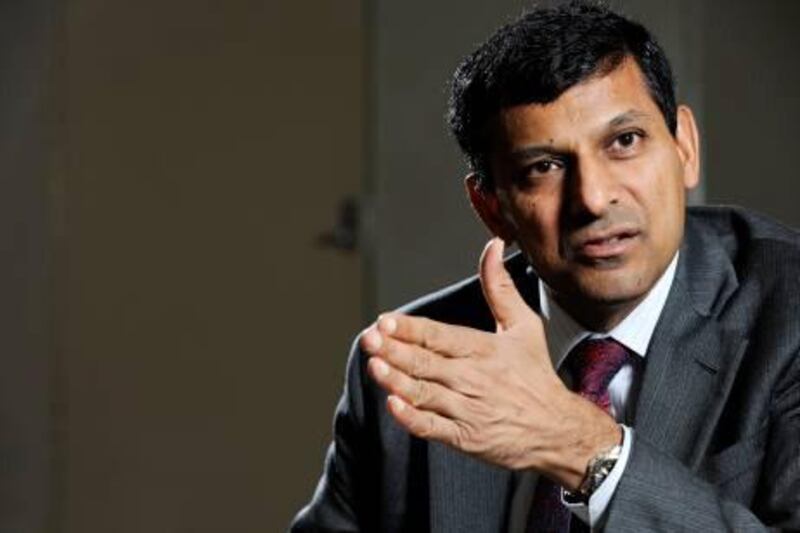Raghuram Rajan will have a difficult task on his hands when he takes up the role of governor of the Reserve Bank of India next month.
Monetary policy has come into sharp focus in India as the country's central bank tries to carefully balance the contrary forces of slowing growth with high inflation and a fragile rupee.
The current RBI governor, D Subbarao, finishes his five-year tenure on September 4. Before the announcement that Mr Rajan, a former IMF chief economist, would step into his shoes, there was no clear favourite for the position. On the day Mr Rajan's appointment was announced, India's stocks plunged and the rupee tumbled to yet another record low, a stark warning of the magnitude of the challenges the new central bank chief will have to grapple with.
Still, the consensus among industry leaders and analysts alike is that Mr Rajan is the right man for the job. Currently in the role of chief economic adviser to the finance ministry and having predicted the global financial crisis in 2005, three years before it occurred, his credentials are strong. At the age of 50, he is relatively young for an RBI governor.
"The new governor has his work cut out," says Sonam Udasi, the senior vice president and head of research at IDBI Capital Markets. "Because he has had such a great experience in predicting the crisis and being at the IMF, he brings a certain global perspective as well, and he has been chief economic adviser for the past one year, so he is well aware of the problems that are faced in the country today. From that angle, I think from day one he will begin to put his stamp of authority and be thinking about how he needs to tackle this."
The RBI is caught between a rock and a hard place, Mr Udasi says. Lowering interest rate cuts would make borrowing cheaper and help to stimulate the economy after growth hit a decade low of 5 per cent in the last financial year. But lower rates would be detrimental for the weak rupee and would exacerbate inflation levels.
"It's a very hard balance," he says.
Mr Rajan is well aware of that there is no easy solution to the challenges he will be managing during his three-year tenure.
"These are challenging times for the Indian economy, and the RBI and the government will work together," he said. "We don't have a magic wand to make the problems disappear. But absolutely we will deal with them."
Mr Rajan was born in Bhopal, studied at Indian Institute of Technology Delhi and Indian Institute of Management Ahmedabad and completed a doctorate at Massachusetts Institute of Technology. He has authored acclaimed books, including one titled Saving Capitalism from the Capitalists.
Sujan Hajra, who is now the chief economist at Anand Rathi and spent more than a decade at the RBI, says he thinks Mr Rajan is well qualified for the job through his academic credentials and experience.
"Given his views on how to run a capitalistic economy and he's a pro-market kind of a person, so all those things should actually give some confidence to investors, both Indian as well as global," Mr Hajra says. "I think his recent stint at the ministry of finance is also likely to make him slightly more growth oriented, so to that extent the monetary policy that he rolls going forward is likely to be reasonably accommodative.
"But having said that, I personally feel that it's not the governor's personality which impacts the monetary policy very much. It's more of a system-driven thing in the RBI. Where the governor's role becomes much bigger is on structural reforms. Say for example, new bank licences or any kind of financial sector reforms, there the personality of the governor matters far more than the day-to-day monetary policy making."
Mr Subbarao, the current governor, had set high standards for the position and his work was "exemplary" as he steered monetary policy through some of the most difficult economic circumstances, according to Mr Hajra.
Industry in India heaped praise on Mr Rajan. "He has impeccable academic credentials and global experience which are well suited to his role as RBI Governor in a world of increasingly interconnected economies," says AM Naik, the group executive chairman of Larsen & Toubro, an Indian multinational conglomerate, which spans several sectors such as information technology and construction. "His young age will give him the required energy and dynamism to deal with the rapidly changing environment. He is the most appropriate person to guide India's monetary policy through the turbulent times that the global economy is facing."
Analysts point out that the RBI is governed by a board of directors, which can limit the governor's decision-making powers.
"When people are not part of RBI they talk [with] a certain tone," says Mr Udasi. "But once they come into the RBI, they see the extent of the balance sheet and you're part of a board. So you have a voice, but you have to take "board with you".
Everyone will be watching closely to see how Mr Rajan adapts to the role.
"He is quite young, but a unique situation like India needs unique solutions," says Mr Udasi. "I don't think age has anything to do with it. How he handles the situation, the pragmatism, that will be more important. The next six months will be critical for him to showcase how he's going to handle things."





